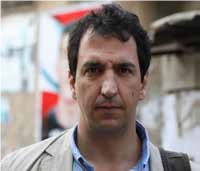2017
The Story
The Greatest Exodus of Our Time. The lengthy civil war in Syria created millions of refugees throughout the Middle East, most of them displaced Syrians living in camps scattered throughout the region. We hear their stories and Canada’s response to the mass forced exodus and efforts to help both refugees and the countries hosting them.
The Journalist
Michael Petrou is a journalist, foreign correspondent, author and historian. He has reported from across Latin America, Europe, the Middle East and Central Asia. Petrou has won three National Magazine Awards, including for reportage from Haiti and Ukraine, and he has been nominated for six others for stories from Russia, Egypt and Iraq. Petrou has a doctorate in modern history from the University of Oxford, and in 2018 was the Martin Wise Goodman Canadian Nieman Fellow at Harvard University. He is currently an Adjunct Research Professor at the Department of History, Carleton University.
The Reporting
The Reporter’s Notebook
Hasan Kara is mayor of Kilis, a Turkish town on the border with Syria that, before the Syrian civil war began, had about as many residents as does Lethbridge. Kilis now hosts 135,000 Syrian refugees, three times more than live in all of Canada.
Kara, when I met with him, was proud of this, and a little bemused by the praise Canada and some European countries received for shouldering a much lighter burden.
A Belgian mayor was given some sort of international award because his town took in 400 Syrians, Kara said. “I should have sent 134,600 Syrians across the Aegean to Europe,” he joked, implying that if he sheltered only 400 refugees, the rest of the world might pay attention. Of Canada’s comparatively modest hospitality, he said: “I’ve seen Canada. It is empty.”
This conversation, and many others I had while traveling in Turkey, Lebanon and Jordan, the three countries hosting the greatest number of Syrian refugees, reminded me that good foreign reporting can both open our eyes to the world outside Canada and force us to look at our own country with a new perspective.
I wanted to explore the Syrian refugee crisis where its effects are greatest — not in Canada, not in Europe, but in the Middle East, where basic infrastructures and social fabrics have been strained at times to the breaking point, and where millions of displaced Syrians try to rebuild lives that have been shattered in ways that will echo for generations. Winning the R. James Travers Foreign Corresponding Fellowship allowed me to report on this story in the depth it deserves.
One of the encounters that made the biggest impression on me was with two ten-year-old Syrian refugee sisters, Hasma and Murphad, who worked in an underground sewing factory in the Turkish city of Mersin.
I knew such places existed, but of course they don’t advertise their locations. To find them, my fixer and I drove from Gaziantep to Mersin and walked through the city’s poorer districts until we caught a glimpse of humming sewing machines through a half-open door. I’m not sure that I would have invested the time and money chasing that angle in the course of a normal assignment, given that there was a good chance we would not find what we were looking for. The Travers Fellowship allowed me to take such risks.
That’s one of the reasons I am profoundly grateful to have had this opportunity, and why I know the fellowship will continue to foster impactful journalism by future recipients. The fellowship is far more than a financial award. It’s also a chance to seek out stories that may be difficult to find and to take the time to probe them in detail.
For future recipients, I would only add something that may seem obvious but is nonetheless important.
Good foreign reporting depends on hard work, including extensive preparatory research and planning.
At the same time, you need to be flexible enough to jettison plans that aren’t working and pursue new reporting angles as they emerge. A Travers Fellowship provides the opportunity to do this. It’s a wonderful gift.


